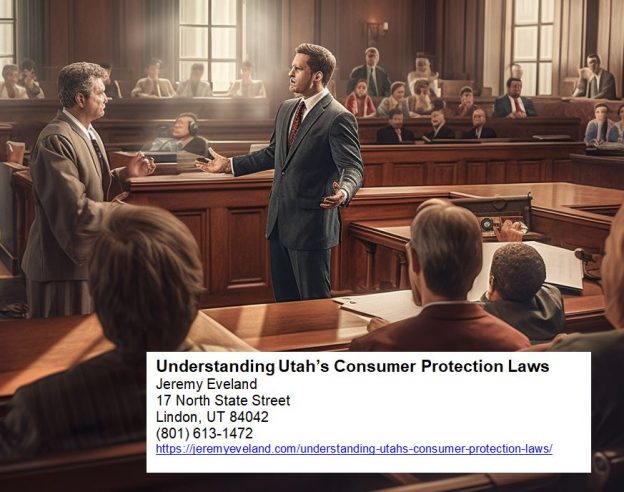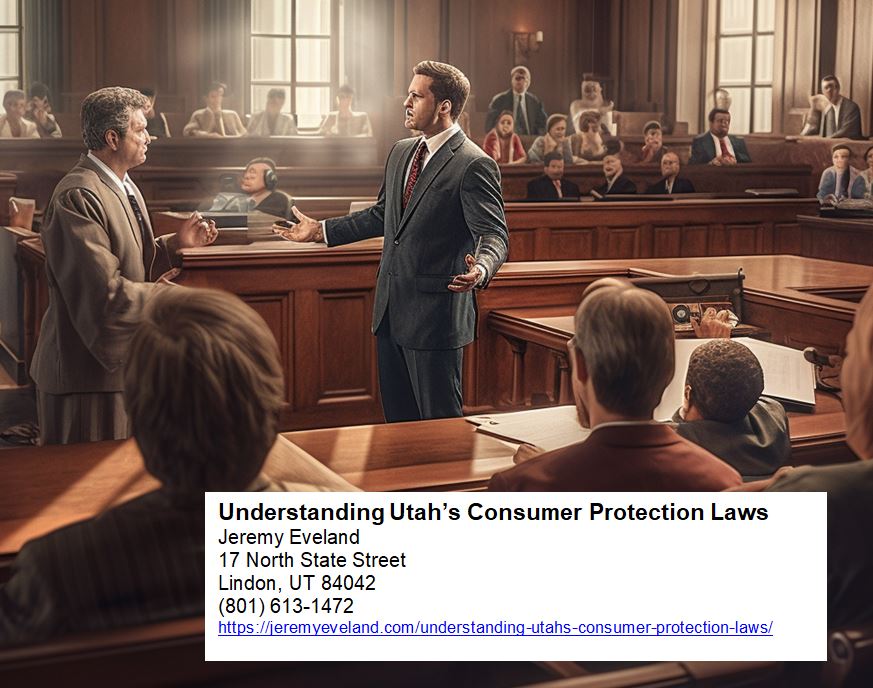In today’s digital age, businesses must navigate complex rules and regulations to ensure compliance with the Federal Trade Commission (FTC) guidelines. These guidelines aim to protect consumers and promote fair competition, making it crucial for businesses to understand their obligations. As a trusted resource for businesses and business owners, our lawyer’s website provides comprehensive insights into the various aspects of FTC guidelines. By exploring our articles, you will gain valuable knowledge to navigate the legal requirements, protect your business’s reputation, and prevent costly penalties. Call our experienced lawyer for a consultation to proactively address any concerns and ensure your business is operating within the FTC guidelines.
Overview of FTC Guidelines
What are FTC Guidelines?
FTC Guidelines, also known as the Federal Trade Commission Guidelines, are a set of regulations and rules established by the Federal Trade Commission (FTC) in the United States. These guidelines aim to protect consumers and promote fair competition in the marketplace by prohibiting unfair and deceptive practices.
Why are FTC Guidelines important?
FTC Guidelines play a crucial role in maintaining a fair and transparent business environment. They ensure that companies do not engage in deceptive practices that may mislead or harm consumers. By adhering to these guidelines, businesses can build trust with their customers and avoid legal consequences.
Who do the FTC Guidelines apply to?
The FTC Guidelines apply to all businesses operating in the United States, regardless of their size or industry. This includes both online and offline businesses, as well as individuals and organizations involved in advertising, marketing, sales, and commerce.
Key objectives of FTC Guidelines
The key objectives of FTC Guidelines are:
- To protect consumers from unfair and deceptive practices.
- To promote and maintain fair competition in the marketplace.
- To ensure truthful and accurate advertising and marketing practices.
- To safeguard consumer privacy and data security.
Unfair and Deceptive Practices
Definition of unfair and deceptive practices
Unfair and deceptive practices involve actions or omissions by businesses that are likely to deceive or harm consumers. These practices can include false advertising, hidden fees, misleading claims, unauthorized charges, and more. The FTC Guidelines provide specific criteria for determining what constitutes unfair and deceptive behavior.
Examples of unfair and deceptive practices
Examples of unfair and deceptive practices include:
- False advertising: Making false or misleading claims about a product or service.
- Failure to disclose information: Withholding crucial information that would affect a consumer’s decision.
- Bait-and-switch: Advertising a product at a low price but then attempting to sell a different, more expensive item.
- Pyramid schemes: Promoting a business opportunity where participants profit mainly by recruiting new members rather than by selling a legitimate product or service.
Consequences of engaging in unfair and deceptive practices
Engaging in unfair and deceptive practices can have severe consequences for businesses. The FTC has the authority to investigate and take enforcement actions against companies that violate the guidelines. Consequences may include fines, injunctions, criminal charges, consent decrees, and reputational damage. Additionally, affected consumers may file individual lawsuits or class actions against the business.

How to ensure compliance with FTC Guidelines
To ensure compliance with FTC Guidelines, businesses should:
- Familiarize themselves with the FTC Guidelines and relevant laws.
- Maintain accurate and truthful advertising and marketing practices.
- Disclose all material information to consumers.
- Regularly review and update privacy policies and data security practices.
- Train employees on compliance and implement internal monitoring systems.
- Monitor industry-specific regulations that may impact their business.
- Consult with legal counsel to ensure full compliance with the FTC Guidelines.
Advertising and Marketing
Advertising claims and substantiation
When making advertising claims, businesses must have a reasonable basis to support those claims. This means that the claims should be truthful, backed by evidence, and not likely to mislead consumers. The FTC may require businesses to have adequate scientific evidence, testimonials, or expert endorsements to substantiate their claims.
Disclosures and disclaimers in advertising
Disclosures and disclaimers play a critical role in ensuring that consumers have all the necessary information about a product or service. The FTC Guidelines require businesses to make clear and conspicuous disclosures when necessary, especially in cases where the main message may mislead consumers without additional information. Disclosures should be presented in a way that consumers can easily notice, read, and understand.
Endorsements and testimonials
Endorsements and testimonials can have a significant impact on consumers’ purchasing decisions. The FTC Guidelines require businesses to disclose any material connections between endorsers and the advertised product or service. Additionally, endorsements must reflect the honest opinions, findings, beliefs, or experiences of the endorser at the time of the endorsement. False or misleading endorsements are considered deceptive practices.
Online marketing and social media
With the rise of online marketing and social media influencers, the FTC Guidelines address these platforms specifically. Businesses must clearly disclose any material connections between influencers and the products or services they endorse. Disclosures should be easily noticeable and placed in proximity to the endorsement. Additionally, businesses should educate their influencers on the guidelines and monitor their compliance.
Telemarketing regulations
Businesses engaging in telemarketing activities must adhere to specific regulations outlined by the FTC. These regulations include restrictions on calling hours, requiring identification of the caller, maintaining a company-specific Do Not Call list, and honoring consumers’ requests to be removed from their calling lists.
Privacy and Data Security
Collection and use of personal information
Businesses must be transparent about how they collect and use consumers’ personal information. The FTC Guidelines require businesses to provide clear disclosures about the types of information collected, purposes of collection, and any third parties with whom the information may be shared. Companies need to obtain consumers’ consent before collecting sensitive information or sharing it with others.
Privacy policies and disclosures
Privacy policies are essential for businesses to inform consumers about their data collection and usage practices. The FTC Guidelines require privacy policies to be readily available to consumers, written in plain and easily understandable language, and accurately reflect the company’s practices. It is crucial for businesses to regularly review and update their privacy policies to align with changing regulations and technological advancements.
Data breach notification requirements
In the event of a data breach that exposes consumers’ personal information, businesses have an obligation to notify affected individuals promptly. The FTC Guidelines outline the requirements for data breach notifications, including providing clear and detailed information about the breach, the types of information compromised, remedial actions taken, and steps consumers can take to protect themselves.
Children’s Online Privacy Protection Act (COPPA)
COPPA is a federal law that imposes certain requirements on websites and online services directed towards children under 13 years of age. The FTC Guidelines provide guidance on compliance with COPPA, including obtaining verifiable parental consent, providing clear privacy notices, implementing adequate security measures, and giving parents the ability to review and delete their child’s information.
Consumer Rights and Protection
Consumer rights under FTC Guidelines
Consumers have several rights under the FTC Guidelines, including the right to:
- Expect truthful and accurate advertising and marketing practices.
- Obtain clear and conspicuous disclosures about products or services.
- Be protected from unfair, deceptive, or fraudulent business practices.
- Have their personal information handled in a secure and responsible manner.
- File complaints with the FTC if they believe their rights have been violated.
Consumer complaint process
The FTC provides consumers with a complaint process to report any violations of the FTC Guidelines. Consumers can submit complaints online through the FTC’s official website or by calling the agency directly. The FTC reviews consumer complaints and takes appropriate actions, which may include investigations, penalties, or legal enforcement actions.
Remedies and enforcement actions
The FTC has broad enforcement powers to address violations of the FTC Guidelines. When businesses are found to have engaged in unfair or deceptive practices, the FTC can seek various remedies, including injunctions, civil penalties, consumer redress, and corrective advertising. In some cases, the FTC may also pursue criminal charges against individuals or entities involved in deceptive practices.
Industry-Specific Regulations
Financial services regulations
The financial services industry is subject to specific regulations beyond the general FTC Guidelines. These regulations govern areas such as consumer lending, debt collection, credit reporting, and insurance. Businesses in the financial sector need to ensure compliance with both the FTC Guidelines and industry-specific regulations to avoid legal and regulatory issues.

Health and pharmaceutical regulations
Health and pharmaceutical companies must comply with additional regulations concerning advertising, labeling, and claims related to health products and services. The FTC Guidelines, in conjunction with regulations from agencies like the Food and Drug Administration (FDA), provide comprehensive guidance on truthful marketing practices in the healthcare industry.
Telecommunications and ISP regulations
Telecommunications and internet service providers (ISPs) operate in a highly regulated industry. Alongside the FTC Guidelines, businesses in this sector must adhere to regulations imposed by the Federal Communications Commission (FCC) and other regulatory bodies. Compliance with these regulations ensures fair practices in areas such as billing, advertising, privacy, and network management.
Food and drug labeling regulations
The FTC Guidelines address important aspects of food and drug labeling to protect consumers from false or misleading information. In conjunction with regulations from the FDA, businesses must ensure that their product labels accurately represent information about ingredients, nutritional content, health claims, and other relevant details.
Compliance and Risk Mitigation
Developing a compliance program
To ensure compliance with the FTC Guidelines, businesses should establish a comprehensive compliance program. This program should include policies and procedures tailored to the specific industry and business operations, regular employee training, internal monitoring and auditing, and mechanisms for reporting and responding to potential violations.
Conducting internal audits and monitoring
Regular internal audits and monitoring are crucial for businesses to identify and address potential compliance issues. By reviewing advertising materials, marketing practices, privacy policies, data security measures, and other relevant areas, businesses can proactively identify areas of non-compliance and take corrective actions promptly.
Responding to FTC investigations
In the event of an FTC investigation, businesses must respond promptly and cooperatively. It is important to seek legal counsel to guide the response and ensure compliance with the investigation process. Providing timely and accurate information, cooperating with the FTC, and implementing remedial actions as necessary can help mitigate potential penalties.
Mitigating legal and financial risks
Compliance with the FTC Guidelines is essential for mitigating legal and financial risks. Non-compliance can result in substantial penalties, litigation expenses, damage to reputation, and loss of customer trust. By proactively implementing effective compliance programs, businesses can minimize their exposure to legal and financial risks associated with FTC violations.
Penalties and Legal Actions

Civil penalties for FTC violations
When businesses fail to comply with the FTC Guidelines, they may face civil penalties. The FTC has the authority to seek civil monetary penalties for each violation, which can amount to thousands or even millions of dollars. The specific penalties depend on various factors, including the severity of the violation, the monetary harm caused to consumers, and the business’s intent.
Injunctive relief and consent decrees
In addition to civil penalties, the FTC may seek injunctive relief through court orders or consent decrees. Injunctive relief aims to prevent further violations and may require businesses to cease certain practices, change advertising materials, implement compliance programs, or pay restitution to affected consumers.
Criminal prosecutions for deceptive practices
Serious violations of the FTC Guidelines may lead to criminal prosecutions. Although criminal prosecutions are relatively rare, the FTC can work with law enforcement agencies to pursue charges against individuals or entities involved in deceptive practices. Criminal penalties may include fines, imprisonment, or both.
Private lawsuits and class actions
Consumers affected by deceptive practices have the right to file private lawsuits against businesses. These lawsuits can seek various remedies, including monetary damages, injunctive relief, and attorney fees. In some cases, multiple affected consumers may join together in a class action lawsuit, amplifying the potential damages.
Recent Updates and Trends
Recent changes to FTC Guidelines
The FTC periodically updates its guidelines to address emerging issues and industry trends. Businesses must stay informed about these changes to ensure ongoing compliance. Recent updates to the FTC Guidelines have focused on areas such as influencer marketing, online tracking and targeting, data security, and online reviews.
Key court cases and precedent
Court cases involving FTC enforcement actions help shape the interpretation and application of the FTC Guidelines. Following key court cases and precedent is essential for businesses seeking to understand how the FTC Guidelines are applied in practice. Analyzing court decisions can provide insights into compliance best practices and potential pitfalls to avoid.
Emerging trends in FTC enforcement
The FTC continuously adapts its enforcement efforts to address new challenges and emerging trends in consumer protection. Recent trends in FTC enforcement include increased scrutiny of data security practices, enforcement actions related to online reviews, influencer marketing disclosures, and privacy violations stemming from emerging technologies like artificial intelligence and the Internet of Things (IoT).
FAQs about FTC Guidelines
What is the role of the FTC in enforcing consumer protection laws?
The FTC plays a vital role in enforcing consumer protection laws by ensuring businesses comply with the FTC Guidelines. The agency investigates complaints, engages in educational outreach, issues regulations and guidelines, and takes legal enforcement actions against businesses that engage in unfair or deceptive practices.
Are there any exemptions to FTC Guidelines?
While there are no blanket exemptions to the FTC Guidelines, certain industries or practices may have specific regulations or standards that businesses must adhere to in addition to the general FTC Guidelines. For example, the healthcare industry has additional regulations from agencies like the FDA, while financial services have regulations imposed by the Consumer Financial Protection Bureau (CFPB) in addition to the FTC Guidelines.
How can I file a complaint with the FTC?
To file a complaint with the FTC, visit the agency’s official website or call the FTC’s toll-free Consumer Response Center. The FTC encourages consumers to provide detailed information about the alleged violation, including any evidence or documentation available. All complaints are reviewed, and appropriate actions are taken by the agency.
Can FTC penalties be negotiated or reduced?
In some cases, businesses facing potential FTC penalties may be able to negotiate settlements with the agency. These settlements, often referred to as consent decrees, can result in reduced penalties or other forms of relief, such as changes to advertising practices or compliance monitoring. However, the outcome of negotiations depends on the specific circumstances of each case.
What should I do if my competitors violate FTC Guidelines?
If you believe that your competitors are engaging in unfair or deceptive practices in violation of the FTC Guidelines, it is essential to gather evidence and document the alleged violations. You can file a complaint with the FTC and consult with legal counsel to explore potential legal actions against your competitors, such as sending cease-and-desist letters or pursuing litigation.
This article is intended for general informational purposes only and does not constitute legal advice. For specific legal guidance regarding FTC Guidelines and compliance, please consult a qualified attorney.
FAQs
Q: Can my business be exempt from FTC Guidelines?
A: While there are no blanket exemptions, certain industries may have specific regulations in addition to the FTC Guidelines. It is important to consult with legal counsel to determine the specific obligations that apply to your business.
Q: What are the penalties for violating FTC Guidelines?
A: Violating FTC Guidelines can result in civil penalties, injunctive relief, consent decrees, criminal charges, private lawsuits, and class actions. The specific penalties depend on the severity of the violation and its impact on consumers.
Q: How can I ensure compliance with FTC Guidelines?
A: To ensure compliance, familiarize yourself with the FTC Guidelines, maintain accurate and truthful advertising practices, disclose all material information, implement privacy policies, regularly review and update compliance programs, and seek legal counsel when necessary.
Q: How long does an FTC investigation typically last?
A: The duration of an FTC investigation varies based on several factors, such as the complexity of the case and the nature of the alleged violation. Investigations can take months or even years to complete.
Q: Can I negotiate FTC penalties?
A: In some cases, businesses may be able to negotiate settlements, such as consent decrees, with the FTC. However, the outcome of negotiations depends on the specific circumstances of each case.























